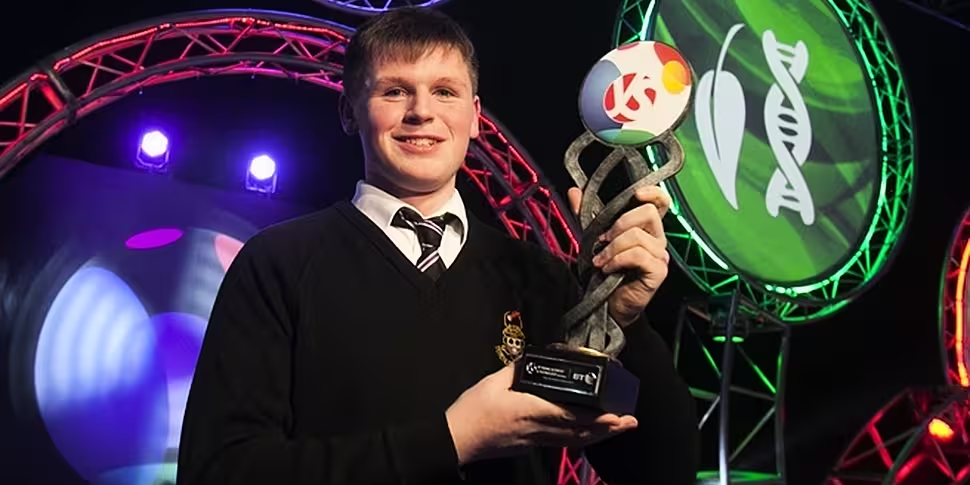What were you doing when you were 16? Playing football maybe? Trying to avoid doing your homework? Sneaking out of your bedroom window to meet your friends?
Whatever it was, it is unlikely that you were creating an unbreakable encryption system using multi-jurisdictional quorum sharding. Then again, not every 16-year-old is like Shane Curran.
Last weekend, Curran was crowned the BT Young Scientist 2017 for his project called qCrypt. The technology promises to be able to store secrets forever, and even with the advent of quantum computing —which promises a, well, quantum leap forward in processing capability — his encryption system claims to be secure.

Image: President Michael D. Higgins as he opens the 2017 BT Young Scientist and Technology Exhibition in the RDS, Dublin. Sasko Lazarov/RollingNews.ie
The general idea of what is called post quantum cryptography has been discussed and debated in academic circles for years, and there have been a lot of theoretical papers written about it. But to date there have been very few systems released with a usable implementation of this technology — making Curran’s project all the more remarkable.
Curran’s claim that the encryption is unbreakable is a bold one, but despite his young age, he remains confident that his work will stand up to scrutiny. “From a theoretical perspective, it seems pretty solid,” Curran told Newstalk during his lunch break at Terenure College this week, where he is a fifth year student.
No Surprise
For anyone who has known or spoken to the 16-year-old over the last decade, his victory in the RDS will not have been a surprise.
At just six years of age, he carried out his first install of the Linux operating system. A year later he was coding using Visual Basic and created a basic web browser which he made available for anyone to download. By the age of 11, he was coding in multiple languages and had developed an online database of people’s names and email addresses called Peoplez.info.
A year later he created Libramatic, an online library management system after seeing his school spend a huge amount of money on software which didn’t make the librarian’s life any easier.
Curran’s latest project is his most ambitious yet, and will attract a huge amount of attention from academics as well as big companies looking to ensure they can protect their customers' data effectively.
"There has definitely been a lot of interest," Curran said, adding that qCrypt “is certainly a commercially viable idea,” though he wouldn’t elaborate on who he was in touch with.
The Next Collison
Curran’s victory draws the mind back to 2005 when Patrick Collison, then a 16-year-old student from Limerick, won the top prize for creating a programming language called Croma. Collison and his brother John have since gone on to create Stripe, an online payment technology company which is working with some of the biggest brands in the world, including Apple, Twitter, Facebook and American Express.
In November, it was valued at $9 billion, making each of the Collison brothers billionaires, something Curran certainly sees as an inspiration.
"The work Patrick Collison and his younger brother John have done is a huge aspiration or goal to set. If I could get anywhere near what the Collisons have done, it would be fantastic.”
Curran is not shy about his desire to become CEO of a major global company, listing Google co-founders Sergey Brin and Larry Page as people he is seeking to emulate. But it’s not all about the money.

Image: Shay Walsh,Managing Director, BT Ireland, Minister for Education and skills Richard Bruton with the winner of BT Young Scientist and Technology Award 2017, Shane Curran aged 16, a 5th year student from Terenure College. Leah Farrell/RollingNews.ie
"If it's possible to simultaneously have something which is useful to the world as a whole as well as producing a decent revenue stream, then that would fantastic,” Curran said. “I'm not completely motivated by money but it would be great to have a tool that would be useful to millions or even billions of people over the next while — and that's something to aspire to."
Self Taught
So what about the next Shane Curran, is the government doing enough to encourage children to explore the skills needed for a career in technology?
Being so steeped in coding and computer science from a young age, it would be reasonable to expect Curran to back government plans to make coding a core curriculum subject, but that is not the case.
"I have an alternative view on this,” Curran said. “The idea that programming should be taught in schools is a very big topic at the moment, but I am not completely of the opinion that it should be [part of] the curriculum or brought into a classroom setting.”
Curran is almost completely self-taught, and he believes that this approach is the best way of getting to grips with what is seen by many as an intensely difficult topic to broach.
"As a general topic I think it works much better if it is self-driven and directed by the students themselves. If school's could offer some optional club in the style of Coder Dojo, [and] if they could encourage people to be more autodidactic and self-driven, that would be fantastic —but I don't believe it should be compulsory in schools.”
So what’s next for Curran? He is continuing to study for his Leaving Certificate and his plan to attend university hasn’t changed, however as he prepares to head to Estonia in September to take part in the EU young scientist competition, and interest in qCrypt grows, his plans could change very quickly.
“I will have to see if an opportunity arises, everything has to be considered. [I will] see what the next year has in store and may a decision based on that."









